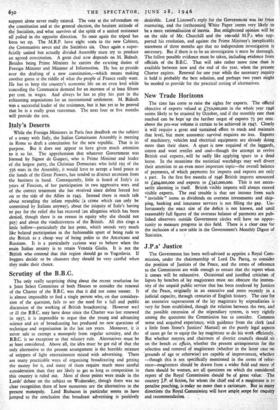J.P.s' Justice
The Government has been well-advised to appoint a Royal Com- mission, under the chairmanship of Lord Du Parcq, to consider the position of Justices of the Peace, and the terms of reference to the Commission are wide enough to ensure that the report when it comes will be exhaustive. Occasional and justified criticism of lapses by benches of lay magistrates must not obscure the immen- sity of the unpaid public service that has been rendered by Justices of the Peace, originally in an executive and more recently in a judicial capacity, through centuries of English history. The case for an extensive supersession of the lay magistrate by stipendiaries is very far from established, though the relation between the two, and the possible extension of the stipendiary system, is very rightly among the questions the Commission has to consider. Common sense and acquired experience, with guidance from the clerk (and a little from Stone's Justices' Manual) on the purely legal aspects of cases go far to equip the lay magistrate to do his work efficiently. But whether mayors and chairmen of district councils should sit on the bench ex officio, whether the present arrangements for the selection and removal of magistrates (whether in the latter case on grounds of age or otherwise) are capable of improvement, whether —though this is not specifically mentioned in the terms of refer- ence—magistrates should be drawn from a wider field and more of them should be women, are all questions on which the considered report of the Royal Commission should be of great value. The country J.P. of fiction, for whom the chief end of a magistrate is to penalise poaching, is today no more than a caricature. But in many directions the Royal Commission will have ample scope for enquiry and recommendation.






























 Previous page
Previous page